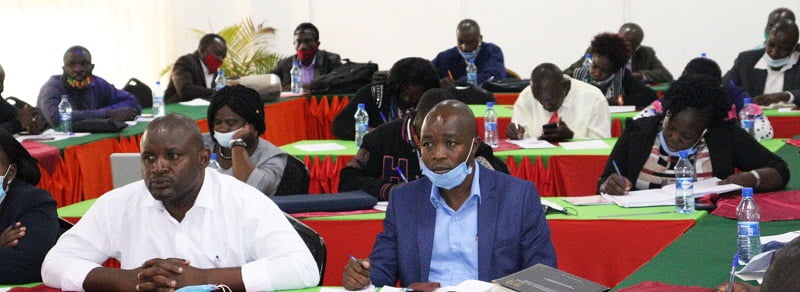By Staff Reporter
Managers of Vocational Training Centres (VTCs), commonly known as Village Youth Polytechnics, have urged the Senate Education Committee to visit the institutions to get the real picture of their state.
Saitoti Wainaina, who is Centre Manager at Oltiasika Vocational Training Centre, told Education News that they welcome the new VTC bill, saying it had come at an appropriate time.
“We feel the bill is timely because it has the opportunity to set guidelines on how education and training can continue even during pandemics. This is an unusual time which calls for unusual legislation,” said Wainaina.
He added that the outbreak of Covid-19 exposed pertinent issues that need to be addressed in the education system, key among them the need for ICT tools like Learner/Trainee Management System so that learning can continue even during pandemics.
Wainaina called for better remuneration structures for Board of Management (BOM) teachers and trainers and non-academic staff.
He also pointed out the need for a thriving light-industry (Jua-Kali) to absorb many people who lost their jobs due to Covid-19.
“For the jua-kali industry to thrive, it only needs affordable raw materials through subsidization and zero rating, marketing support and resource centres where the artisans can regularly update or up-skill themselves on new technologies, processes, equipment, tools and others,” he said.
The centre managers submitted several suggestions to the Senate Education Committee in September last year for incorporation in the bill.
They also called upon Kenya National Qualification Authority (KNQA) to create and recognize the courses for purposes of credit transfer and upward/horizontal mobility, adding that for a long time employers, trainees and parents have been having a hard time choosing between County Vocational Educational Training Centers (CVETCs) Craft/Artisan and a TTI Craft; and between a TTI Diploma and a university diploma.
“We need the TVETA-CDACC, KNQAF to streamline the TVET Sector such that CVETCs offer Craft and Artisan; TTIs offer Diplomas and Higher National Diplomas (HNDs) and universities offer degrees, Masters and PhDs,” reads part of the managers recommendations forwarded to the Senate education committee.
Vocational Instructors scheme of service implementation was also at the centre of their suggestions stating that instructors had suffered for long due to lack of implementation of the TVET scheme of service. They asked for the implementation of the 2012 Youth Training Officers’ Schemes of Service on substantive appointments and promotions.
“We have staff who have stagnated in one job group for over 10 years. Most County VET Directors, Deputy-Directors, Sub-county Directors, Managers, Deputy-managers, senior instructors, HoDs have not been substantially appointed and therefore don’t have commensurate salaries,” added the managers in the recommendations.
In relation to remunerations of the Public VTCs instructors and support staff, the managers wanted them be remunerated either through County Public Service Board or national government grants through the Subsidized Vocational Training Centers Subsidized Grant vote heads.
Managers also wanted to have Trainee Management Systems (TMS) for necessary human resources, curriculum, buildings, equipment, tools among others to effectively implement the TMS, and further requested to be facilitated to implement TMS tools like Google classroom and zoom.
Regarding procurement, they called for a standardised procurement process where all the materials required in the centre are incorporated.
“We need standardisation of procurement such that; DVET procures tools, counties procure buildings, and CVETCs are allowed to procure training materials because the trainer knows what is best for the trainee.”
The also called for a feeding programme for VTCs in arid and semi-arid areas to address the challenge of dropouts due to famine; and being incorporated in the HELB and KUCCPS access in VTCs.
“Currently our trainees don’t get KUCCPS/HELB support yet when counties give bursaries, they give to all students from secondary, colleges to universities which are national government institutions.”
The bill is meant to provide a framework for the establishment of systems for the administration of training in vocational education and training and for other connected purposes.
“The principal object of this Bill is to put in place a legal framework to govern the establishment and management of vocational education and training with the county. One of the functional areas of county governments as provided for under Part 2 of the Fourth Schedule to the Constitution relates to village polytechnics and home craft centres,” reads part of the bill.
If enacted, every public youth polytechnic will be required to put in place a board of management to manage the affairs of the VTC in every county.
“Every public vocational education and training center shall have a Board of Management responsible for the conduct of education and training. It also provides for managers and instructors of vocational education and training and their qualifications to ensure that the vocational education and training centres are professionally managed and operated in accordance with the provisions of this Act,” reads the bill.
The bill has also addressed the issue of curriculum and training in VTCs in an effort to provide standards and quality of education and training, more in particular on curriculum, implementation of vocational training programmes, examination and competency assessment.
“The recognized curriculum development bodies shall be responsible for developing the curricula while the recognized examination, assessment and certification bodies shall be responsible for administering assessment and issuance of certifications,” reads further a section of the bill.
“We pray that this bill will try capture the TVET spirit which is innovativeness/creativity so as to empower communities to use locally available resources to solve local challenges,” said Wainaina.
“We pray that this bill will try capture the TVET spirit which is innovativeness/creativity so as to empower communities to use locally available resources to solve local challenges,” said Wainaina.






